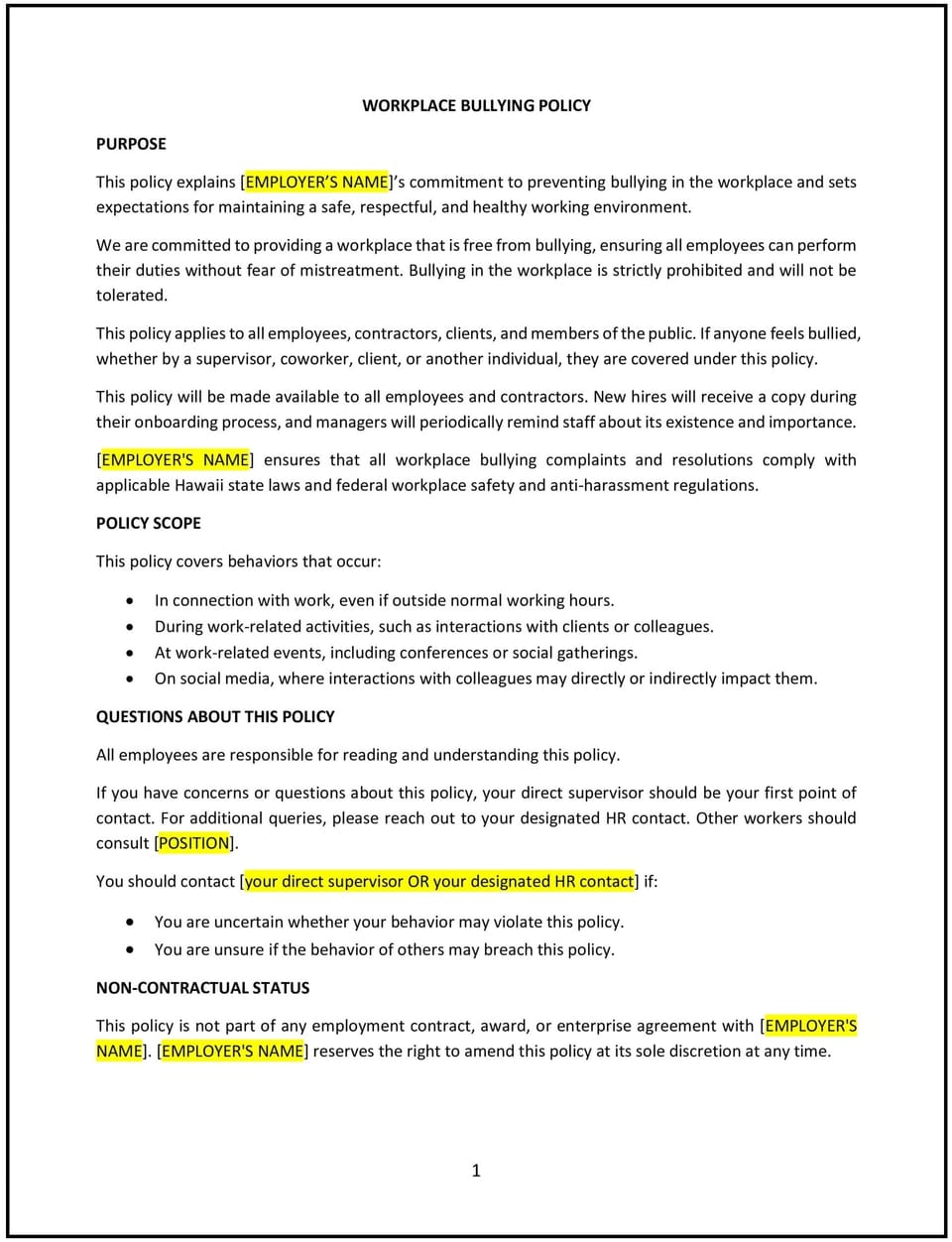Workplace bullying policy (Hawaiʻi): Free template

Workplace bullying policy (Hawaiʻi)
A workplace bullying policy helps Hawaiʻi businesses create a respectful and inclusive environment by addressing harmful behaviors such as harassment, intimidation, or exclusion. This policy outlines procedures for identifying, reporting, and addressing bullying, while reflecting Hawaiʻi’s cultural values of aloha (respect) and ohana (community). It is designed to promote a positive workplace culture, protect employee well-being, and foster collaboration and mutual respect.
By implementing this policy, businesses in Hawaiʻi can reduce conflicts, enhance employee satisfaction, and demonstrate a commitment to a healthy and supportive work environment.
How to use this workplace bullying policy (Hawaiʻi)
- Define workplace bullying: Clearly explain what constitutes bullying, such as verbal abuse, intimidation, exclusion, or undermining behavior.
- Prohibit bullying: Specify that bullying behavior will not be tolerated in the workplace, whether in-person, online, or during work-related activities.
- Establish reporting procedures: Outline how employees can report bullying, including whom to contact and how to document incidents.
- Provide support resources: Offer information about employee assistance programs (EAPs) or local resources for counseling and support.
- Train employees and managers: Educate staff on recognizing bullying, understanding the policy’s guidelines, and fostering a respectful workplace culture.
- Investigate complaints: Describe the process for investigating bullying complaints, including confidentiality and impartiality.
- Address violations: Outline the consequences of bullying behavior, such as disciplinary action or corrective measures.
- Communicate the policy: Share the policy with employees during onboarding and through internal communications to ensure awareness and understanding.
- Monitor and update the policy: Regularly review the policy’s effectiveness and make adjustments as needed to reflect changes in workplace dynamics or business needs.
Benefits of using this workplace bullying policy (Hawaiʻi)
This policy offers several advantages for Hawaiʻi businesses:
- Promotes respect and inclusion: A clear policy fosters a workplace culture built on mutual respect and collaboration.
- Protects employee well-being: Addressing bullying helps create a safe and supportive environment for employees.
- Reduces conflicts: Structured procedures for reporting and addressing bullying minimize misunderstandings and disputes.
- Enhances productivity: A positive workplace culture encourages employees to focus on their work and contribute effectively.
- Builds trust: Transparent processes for handling complaints demonstrate the business’s commitment to fairness and accountability.
- Aligns with cultural values: The policy reflects Hawaiʻi’s emphasis on aloha (respect) and ohana (community).
- Improves retention: Employees are more likely to stay with a business that prioritizes their well-being and addresses bullying effectively.
Tips for using this workplace bullying policy (Hawaiʻi)
- Communicate the policy effectively: Share the policy with employees during onboarding and through regular reminders, such as emails or training sessions.
- Provide training: Educate employees and managers on recognizing bullying, understanding the policy’s guidelines, and fostering a respectful workplace culture.
- Encourage reporting: Create a safe and supportive environment where employees feel comfortable reporting bullying without fear of retaliation.
- Investigate promptly: Address complaints quickly and fairly, ensuring confidentiality and impartiality throughout the process.
- Offer support: Provide access to counseling, EAPs, or other resources for employees affected by bullying.
- Review the policy periodically: Update the policy as needed to reflect changes in workplace dynamics, employee feedback, or business needs.
Q: Why should Hawaiʻi businesses adopt a workplace bullying policy?
A: Businesses should adopt this policy to promote a respectful and inclusive workplace culture, protect employee well-being, and reduce conflicts.
Q: What constitutes workplace bullying?
A: Workplace bullying includes behaviors such as verbal abuse, intimidation, exclusion, or undermining behavior that creates a hostile work environment.
Q: How should employees report bullying?
A: Employees should report bullying to a designated manager or HR representative and provide details of the incident, following the policy’s guidelines.
Q: What should businesses do when a bullying complaint is made?
A: Businesses should investigate the complaint promptly, maintain confidentiality, and take appropriate action to address the behavior.
Q: What resources should businesses provide to employees affected by bullying?
A: Businesses should offer access to counseling, EAPs, or local support services to help employees cope with the impact of bullying.
Q: How can businesses prevent workplace bullying?
A: Businesses should provide training on recognizing bullying, foster a culture of respect, and encourage open communication to prevent bullying behavior.
Q: What consequences should businesses impose for bullying?
A: Consequences may include disciplinary action, corrective measures, or other steps to address the behavior and prevent recurrence.
Q: How often should businesses review the policy?
A: Businesses should review the policy annually or as needed to reflect changes in workplace dynamics, employee feedback, or business needs.
This article contains general legal information and does not contain legal advice. Cobrief is not a law firm or a substitute for an attorney or law firm. The law is complex and changes often. For legal advice, please ask a lawyer.


